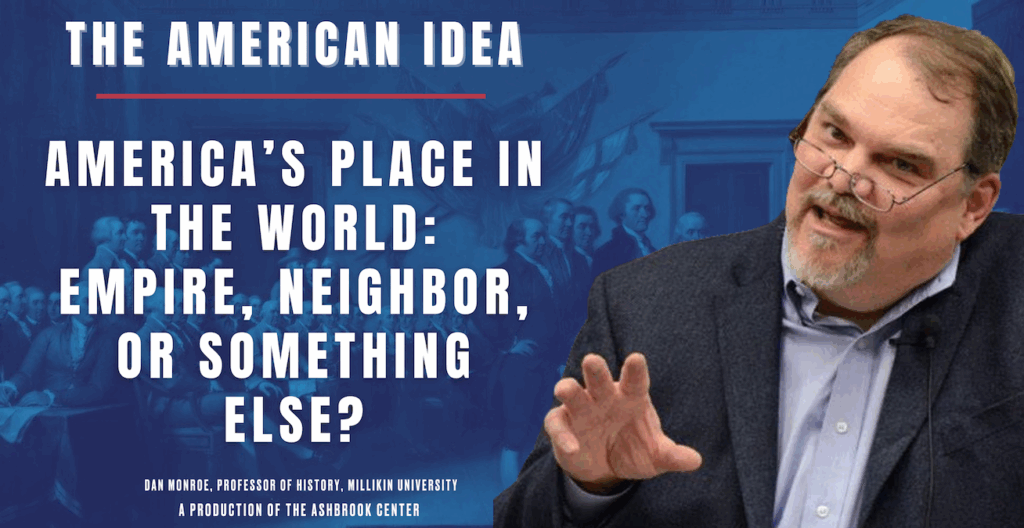America's Place in the World - Empire, Neighbor, or Something Else?
May 21, 2025

Listen and subscribe to the podcast
Join The American Idea’s Listener Email list – get news about upcoming episodes and a chance to offer questions for them, too!
The Republic’s Early Conscience
When John Rutledge proclaimed at the Constitutional Convention that “interest alone is the governing principle with nations,” he articulated what would become one enduring pole in America’s foreign policy compass. Yet George Washington’s 1796 Farewell Address offered a more nuanced view, cautioning against both “excessive hatred for one nation and excessive affection for another.” Washington envisioned an America that could engage with the world while remaining uncommitted to permanent alliances—a nation guided not merely by self-interest but tempered by principles of justice. This vision of American non-interventionism wasn’t merely isolationist; it was pragmatic, aiming to preserve the young nation’s peace and independence while allowing it to command respect on the world stage.
The debate between pure self-interest and moral consideration in foreign engagement has never truly been resolved in American politics. Washington’s careful middle path—what might be considered a principled realpolitik—established a framework that would be tested repeatedly as America’s power and influence grew.
From Moral Beacon to Regional Protector
John Quincy Adams’s articulation that America “goes not abroad in search of monsters to destroy” became a defining statement of early American foreign policy philosophy. As Secretary of State, Adams helped craft the Monroe Doctrine of 1823, effectively declaring the Western Hemisphere off-limits to European colonization. This doctrine represented America’s first major assertion of regional influence, framed not as imperialism but as protection—both of America’s interests and of the newly independent republics of Latin America.
What made the Monroe Doctrine remarkable was its dual nature: while fundamentally serving American self-interest, it was clothed in the moral language of anti-imperialism and republican solidarity. America positioned itself as an ideological beacon, advocating for freedom without necessarily imposing its will through military means. This delicate balance between idealistic rhetoric and pragmatic interests would become increasingly difficult to maintain as America’s power grew in the following decades.
The Closing Frontier and the Imperial Turn
By the late 19th century, America stood at a historical crossroads. Frederick Jackson Turner’s influential 1893 essay had declared the American frontier officially closed, ending the era of continental expansion that had defined much of the nation’s identity. With westward movement no longer an option, America’s sense of destiny and exceptionalism sought new expression beyond its shores.
The Spanish-American War of 1898 marked this pivotal shift. What began as American support for Cuba’s independence struggle against Spanish colonialism ended with the United States acquiring several overseas possessions—the Philippines, Puerto Rico, and Guam. The explosion of the USS Maine in Havana Harbor, regardless of its true cause, became the catalyst for American intervention, fueled by sensationalist media coverage that inflamed public opinion.
In the aftermath of victory, America faced an identity crisis. A nation born in revolution against imperial rule now found itself an imperial power. Theodore Roosevelt’s 1904 Corollary to the Monroe Doctrine completed this transformation, asserting America’s right to intervene throughout Latin America as a “police power” when nations defaulted on debts or faced instability. What had begun as a doctrine to keep European powers out now justified American intervention throughout the hemisphere.
Exceptionalism vs. Imperialism: America’s Unresolved Tension
The acquisition of overseas territories sparked fierce domestic debate. Anti-imperialists invoked the very founders of the republic, citing Washington and Jefferson’s warnings against foreign entanglements. They argued that governing foreign peoples without their consent contradicted America’s foundational principles and would necessitate a large military establishment antithetical to democratic values.
Against them stood those who embraced the concept of the “white man’s burden,” arguing America had a duty to “civilize” and “uplift” peoples in its new territories. President William McKinley and other imperialists framed expansion not as conquest but as a moral mission, though this rhetoric did little to comfort Filipinos who fought American rule in a brutal conflict from 1899 to 1902.
What makes this debate particularly fascinating is how both sides claimed the mantle of American values. Imperialists pointed to America’s exceptional character and duty to spread freedom, while anti-imperialists cited America’s revolutionary heritage and commitment to self-determination. This tension between competing interpretations of American exceptionalism reveals how foreign policy debates often center on conflicting visions of national identity itself.
The trajectory from Washington’s cautious neutrality to Roosevelt’s interventionism reflects more than changing global circumstances—it reveals an evolving understanding of America’s place in the world. As economic power grew, so too did the belief that America had a responsibility to shape global affairs rather than remain aloof from them.
America’s foreign policy evolution contains no simple moral arc. It is instead a story of competing impulses: between self-interest and idealism, between non-intervention and global responsibility, between democratic principles and imperial temptations. Washington’s warning against both excessive hatred and excessive enthusiasm for foreign nations offers wisdom that transcends his era—a reminder that foreign policy requires balance, restraint, and clear-eyed assessment of both interests and values.
The debates that consumed Americans during the Spanish-American War and its imperial aftermath continue to resonate today. As the nation navigates its role in a complex global landscape, the fundamental questions remain: How should America balance pragmatic interests with moral principles? When does intervention constitute liberation, and when does it become imperialism? These are not merely academic questions but the living inheritance of a nation still wrestling with its identity on the world stage.

